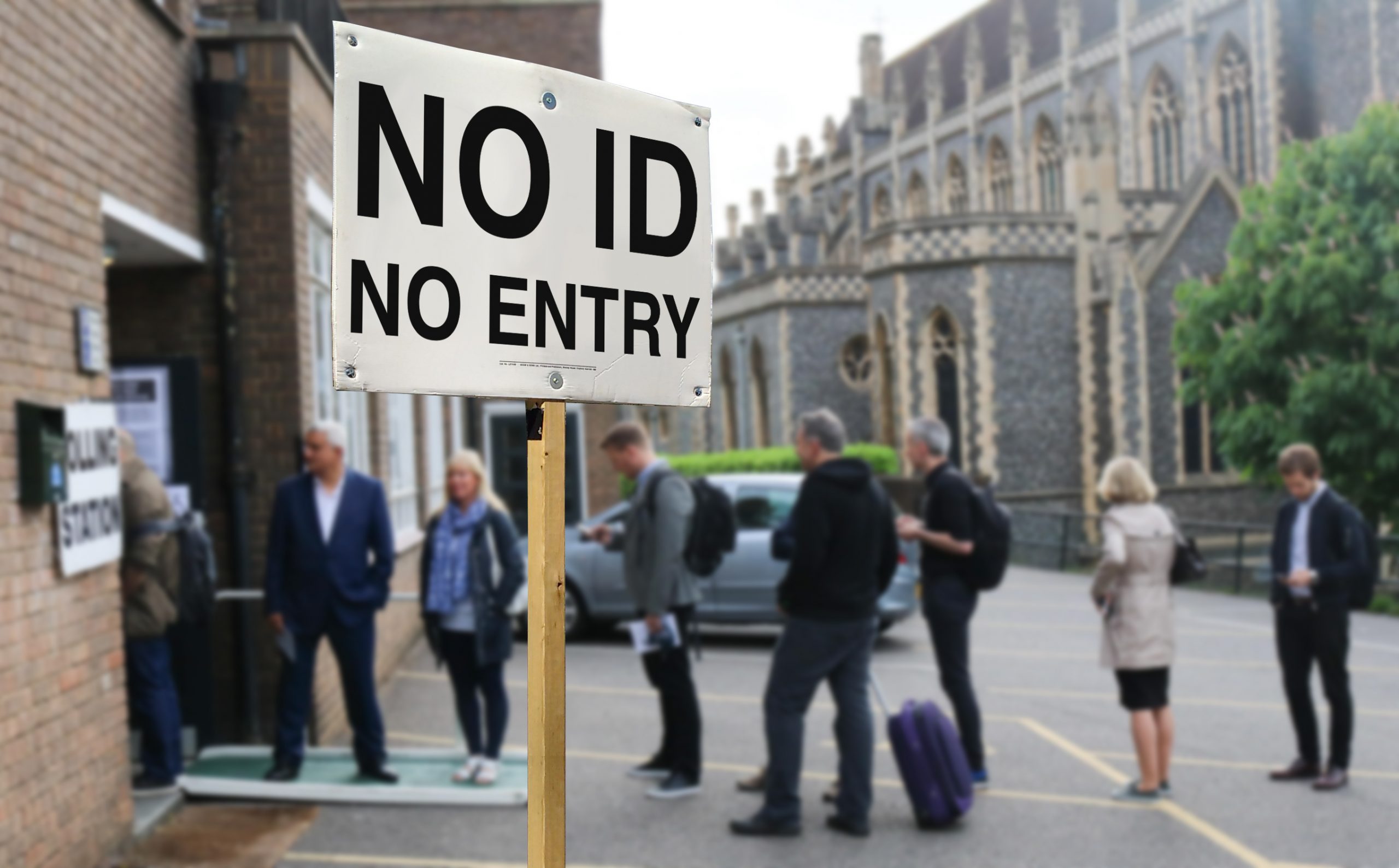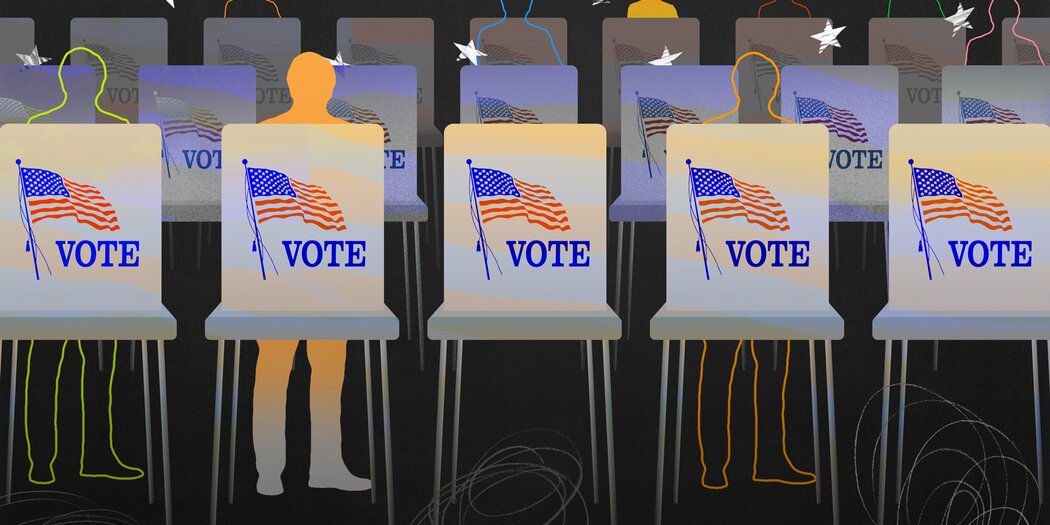Originally posted by Andy Freude
View Post
Fun and games with ballot papers
Collapse
X
-
On a slightly off-topic matter. I have noted with some ennui that BBC reporters tend to refer to voting, using someone else'e identity, as "impersonation". The correct term is "personation". It used to be rife in one part of the U.K., i.e. 'Northern Ireland'.
Comment
-
-
It's money innit, well known fraud attractant - a tad more so than election votes.Originally posted by Stanfordian View PostMy point is how we can vote so easily without showing ID. I'm collecting some currency later today from the post office and I have to show passport or driving licence plus the card I paid for it with.
Comment
-
-
I still claim that the BBC is somewhat biased in its reporting, even if people don't think so. One recent instance is referring to the election outcome as "Boris Johnson's victory" - rather than the "Conservative victory". It's slight, and maybe subtle, but it does have a slightly different ring to it, and I think it's not completely neutral. OTOH the "Conservative victory" is merely factually correct.
Comment
-
-
It's very simplistic to say that few convictions means no problem. Would we really say the same about speeding??Originally posted by Andy Freude View PostI'm not sure what evidence you have that it is an 'increasing concern'. Who is concerned?
"Thankfully electoral fraud is very rare in the UK. Where voter fraud has occurred, it has been isolated and therefore is best tackled locally.
I heard years ago that there was systematic fraud involving residents in old people's homes. Not exactly sure of the mechanism(s) but IIRC it involved postal votes. Who checks the handwriting on applications for these? And of course there's nothing illegal if a kindly soul helps helps the resident with the forms but doesn't interfere with the voter's eventual vote. But party agents were keen to cultivate and reward the home owners who were able to steer voting choices or even fill in a block of these forms themselves. Bear in mind the numbers of inmates with dementia: surely very useful in these circ's.
If true I have seen nothing to suggest that this will have changed.I keep hitting the Escape key, but I'm still here!
Comment
-
-
Would you feel the same about 'Jeremy Corbin's Failure', Dave, as opposed to 'Labour's Failure' ? One could argue in either case the skipper is responsible for his ship.I still claim that the BBC is somewhat biased in its reporting, even if people don't think so. One recent instance is referring to the election outcome as "Boris Johnson's victory" - rather than the "Conservative victory". It's slight, and maybe subtle, but it does have a slightly different ring to it, and I think it's not completely neutral. OTOH the "Conservative victory" is merely factually correct.
I've heard some people claim that BBC News reporting is biased to the Left, and from others it's to the Right. I actually think they've striven to be even-handed...maybe even trying too hard with their vox pops. I feel some sympathy for editors, and personally think they did their best.
Comment
-
-
 Andy Freude
Andy Freude
There has been concern about postal votes from people in care homes which you mention, though my previous answer was to the suggestion that everyone turning up in person should provide ID.Originally posted by LeMartinPecheur View PostIt's very simplistic to say that few convictions means no problem. Would we really say the same about speeding??
On postal votes, there is a measure of verification. Certain information, notably a signature, has to be provided when an application is made for a postal vote. This is matched with the signature provided with the postal ballot and a number of ballot forms are rejected because the date of birth is wrong or the signatures clearly don't match. Where people are unable to sign for some reason, special arrangements are made with the Returning Officer. Suspect voting papers are put on one side until it's learnt whether the odd few ones could have affected the result or not. With respect, the analogy with speeding is not a very good one.
I certainly know of a case where a candidate and his agent were found to have cast fraudulent votes which were discovered. They were caught and the election was rerun without that candidate. And the irony was that he would have won quite easily without cheating.
There are other kinds of electoral fraud (forging signatures on nomination forms, for example) but they aren't prevented by introducing voter ID.
Comment
-
It seems to me that the BBC is biased towards whoever happens to be in power, which isn't how it should work, but aside from that there's also the inevitable way it is skewed to the right by the commercial news media. One example: they give a roundup of tomorrow's front pages which, because the news media are 80% Tory-supporting, is therefore itself 80% Tory-supporting.Originally posted by ardcarp View PostI've heard some people claim that BBC News reporting is biased to the Left, and from others it's to the Right.
Comment
-
-
It may be worth remembering that the highest profile case of electoral malpractice in Tower Hamlets was uncovered by 4 constituents at great personal cost to themselves. The Judge in their private case determined that “Rahman had secured his win with the help of “corrupt and illegal practices” involving the payment of canvassers, the false portrayal of Biggs as racist, allocating community grants in a manner that amounted to bribery, the casting of invalid votes and by bringing “undue spiritual influence” to bear on fellow Muslim voters.” Neither the Electoral Commission nor the Police were interested in investigating the case until forced to do so as a result of the private prosecution.Originally posted by Andy Freude View PostThere has been concern about postal votes from people in care homes which you mention, though my previous answer was to the suggestion that everyone turning up in person should provide ID.
On postal votes, there is a measure of verification. Certain information, notably a signature, has to be provided when an application is made for a postal vote. This is matched with the signature provided with the postal ballot and a number of ballot forms are rejected because the date of birth is wrong or the signatures clearly don't match. Where people are unable to sign for some reason, special arrangements are made with the Returning Officer. Suspect voting papers are put on one side until it's learnt whether the odd few ones could have affected the result or not. With respect, the analogy with speeding is not a very good one.
I certainly know of a case where a candidate and his agent were found to have cast fraudulent votes which were discovered. They were caught and the election was rerun without that candidate. And the irony was that he would have won quite easily without cheating.
There are other kinds of electoral fraud (forging signatures on nomination forms, for example) but they aren't prevented by introducing voter ID."I do not approve of anything that tampers with natural ignorance. Ignorance is like a delicate exotic fruit; touch it and the bloom is gone. The whole theory of modern education is radically unsound. Fortunately in England, at any rate, education produces no effect whatsoever. If it did, it would prove a serious danger to the upper classes, and probably lead to acts of violence in Grosvenor Square."
Lady Bracknell The importance of Being Earnest
Comment
-
-
Yes - it should still have been written up as “Labour’s defeat’. Comment could be in the form of “thought largely to be due to poor leadership by XXX”.Originally posted by ardcarp View PostWould you feel the same about 'Jeremy Corbin's Failure', Dave, as opposed to 'Labour's Failure' ? One could argue in either case the skipper is responsible for his ship.
Re skippers - we don’t have a presidential system in the UK. The leader is not necessarily directly responsible for all policies, nor all the implementation. The situation for an opposition party is different from an incumbent one, though.
Elections are a bit odd - like application forms and covering letters for jobs. The aim is to win the support of the populace, not necessarily to carry out all, or indeed any, of the things promised. Once a person or party has “won” that support, they are free to do what they like, subject to, or moderated by, “reasonable behaviour”. The analogy with job applications ... many people fail to realise that if they give employers (or their agents) a reason to reject their application, they will not get an interview. It’s box ticking - a process. So an election is just one stage in an administrative process. Smarter people and organisations realise that.Last edited by Dave2002; 19-12-19, 09:22.
Comment
-
-
 Andy Freude
Andy Freude
When it comes to apportioning blame, there appear to be five schools of thought, depending on which group one most closely identifies with:
1. Labour canvassers, doorstep message: "Jeremy Corbyn, too left-wing … "
2. Sam McClusky: "Starmer and Thornberry, insisting on the second vote."
3. Momentum/ideologue: "The media, especially the BBC, biased against Labour, Corbyn smears."
4. Labour leadership (JC and JM): "We got it wrong. We apologise."
5. Simon Jenkins: "It was the Liberal Democrats' fault. They should disband."
Meanwhile: The Sun: "BBC’s anti-Brexit bias drips through their entire output — their licence fee days are numbered"
Daily Express: "BBC's Today torn apart as Nick Ferrari hits out at 'flagship' show" (for anti-Tory bias).
Penny to a pound that no one here has changed their mind, and believes exactly what they thought a year ago. Why would you, when you're right?
Comment
-
The point, I would hope, is not to blame but to learn. And indeed the point is for minds to change. It seems clear to me now that Labour's Brexit policy ought to have been just the renegotiation of a "soft" option, without the second referendum added to it. This wasn't clear to me until the results came out. i had thought the actual policy was the only way of not disrespecting the opinions of both Leave and Remain voters, but of course the reason it was tolerated by Remainers in the party was that they were convinced they'd win a second referendum, and the reason it was rejected by Leavers in formerly Labour areas in the country was that they were convinced of the same thing. But it was an impossible situation. As against the enormous disadvantages of more years of Tory government - especially given the lengths they have already demonstrated they'll go to by way of making the "playing field" even less level than it already was - there is at least the consolation that the Tories will now have to own completely the hard or no-deal Brexit they'll saddle the country with, which ought to put them out of power for some considerable time after the next election when they'll be facing a much more united opposition whose useless and anachronistic Blairite appendages will have dropped off finally.
Comment
-



 ) is gammon personified
) is gammon personified
Comment